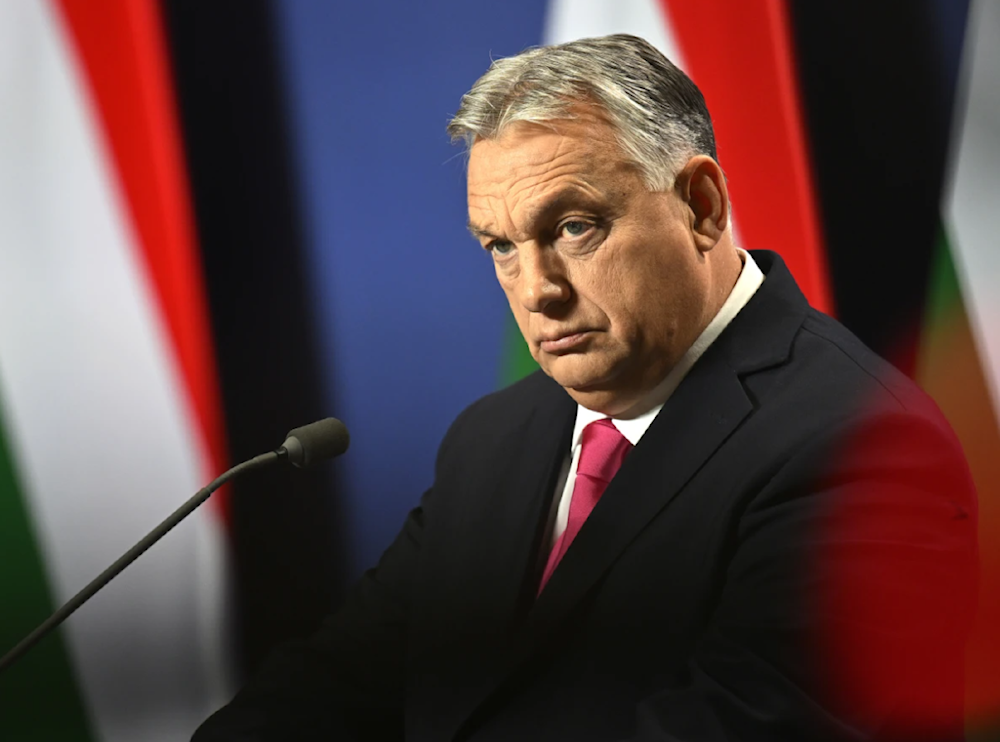Poland suggests Hungary can leave NATO, EU over Orban's remarks
Several EU leaders attacked Orban earlier this month for defying the bloc's directives and engaging in a peace mission for the war in Ukraine.
-

Hungarian Prime Minister Viktor Orban arrives for an annual international press conference in Budapest, Hungary, on December 21, 2023. (AP)
Hungary may exit the European Union and NATO if it disagrees with their policies, said Wladyslaw Teofil Bartoszewski, Poland's Deputy Foreign Minister. The statements came in reaction to Prime Minister Viktor Orban's harsh criticism of Warsaw's measures the day before.
Orban accused Poland of adopting "the most sanctimonious and two-faced policy in the whole of Europe," during a visit to Romania, claiming it is "obliviously doing business with the Russians" while "morally lecturing" Budapest for doing the same.
"We do not do business with Russia, unlike Prime Minister Orban, who is on the margins of international society - both in the European Union and NATO," Bartoszewski responded, as reported by PAP.
Bartoszewski stated that he did not understand why Hungary wished to remain in an organization "it doesn't like so much," adding that it always has the option to leave.
Several EU leaders attacked Orban earlier this month for defying the bloc's directives and engaging in a peace mission for the war in Ukraine during which he visited Kiev, Moscow, and China. Budapest has been exempted from EU sanctions and continues importing Russian oil and gas.
His meeting with US presidential candidate Donald Trump while serving as the rotating president of the EU likewise caused controversy among EU members.
Upon completing his visits to China and Russia, European Parliament members asked that Hungary's right to vote in EU elections be taken away.
Sources familiar with the matter told Politico that the EU's legal service informed member states that Orban's actions violated agreements that prohibit any measures "which could undermine the achievement of the Union's objectives."
During his address in Romania, Orban did not define what he meant when he stated that Poland was still conducting business with Moscow.
Last week, the Russian business newspaper Vedomosti cited that Poland emerged as a major consumer of Russian fertilizer urea. According to Eurostat statistics, Warsaw raised imports by 25% between January and May of this year, as Russian fertilizer shipments surged across the union. Food and fertilizers are not included in the EU sanctions on Russia.
Poland has been one of the most avid backers of Ukraine, functioning as NATO's key conduit for weaponry, ammunition, and equipment delivery to Kiev, although asserting that it is not a participant in the war.
Russia developed financial flexibility in response to sanctions: Orban
In an interview for the Romanian broadcaster M1 on Saturday, Hungarian Prime Minister Viktor Orban on Saturday dismissed allegations that Russia is an autocracy, adding that the country has adapted to Western sanctions and shown economic and social resilience.
"Russia has learned lessons since 2014 and not only learned them but also turned them into actions. They carried out the necessary development of the IT and banking sector, so the Russian financial system did not break down. They have developed the ability to adapt," Orban said.
The official noted that, despite losing the ability to import agricultural products from the West due to sanctions, Russia has become the largest exporter of food products within a few years.
"When Russia is described as a rigid neo-Stalinist autocracy, it is a lie. In fact, we are talking about a country that demonstrated technical, economic, and, as you can see, maybe social flexibility," he added.
He further said that the West has called on the entire world to take action against Russia, but instead, support for Russia has gradually increased.
Orban also mentioned that while he was not surprised by the support from China and the DPRK, he was taken aback by the positions of Iran, India, Turkey, and the Muslim world, which now consider Russia a partner.

 4 Min Read
4 Min Read









